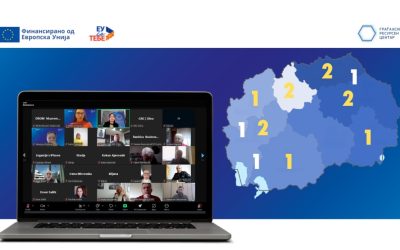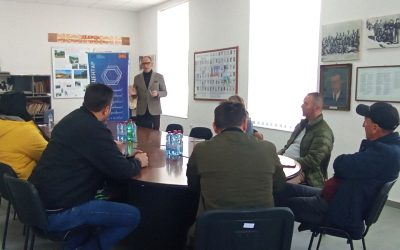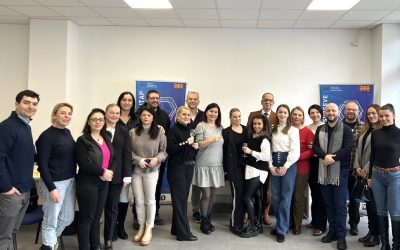The dialogue, the partnership between civil society organisations (CSOs) and institutions should be based on trust, where each side recognizes the importance of the other’s role and respects their views. These were some of the views expressed at the debate on “Structured and Sustainable Dialogue between Civil Society Organisations and Institutions” organized on 3rd November 2023 in the premises of the Civic Resource Centre, Skopje and online. About 70 CSOs’ and government representatives actively participated in the debate.
In her opening address, Irena Ivanova from the Delegation of the European Union emphasized the achievements of the Council for Cooperation between the Government and Civil Society since its existence until now. She reminded that the idea for the Council in Macedonia dates back to 2008, and after a series of discussions, activities and support through projects funded by the European Union and other donors, the Council was established in 2018.

Regional experiences from the functioning of such mechanisms and bodies for dialogue between CSOs and institutions were also shared at the event. “Structured dialogue is an important tool that can contribute to a stronger civil society,” said Vladimir Thano, Vice Chair of the National Council of Civil Society in Albania. He said that in Albania in 2015, a Law was passed on the establishment of a Council of Civil Society, which was established in 2018. The Council in Albania has 12 representatives from civil society elected on an open call and 12 representatives from state administration bodies. One of the challenges faced by this body is the frequent change of government representatives, as well as poor expertise. He stressed the need to increase the capacities and strengthen the Council role.
Zorana Marković, executive director of the Center for Development of Non-Governmental Organisations, as well as a Resource Center for CSOs in Montenegro, shared their experience. The Council in Montenegro was founded in 2010 with 24 members, whereas the president was from the government representatives. For the first eight years, government representatives in the Council were lower-level officials. According to Marković, this affected the functioning and decision-making in the Council. In 2018, a Decision was passed to include the highest-level Government representatives in the Council. Then, the number of Council members was reduced to 12 (6 from CSOs and 6 from the government), and the chairperson of the Council is from CSOs. “During the first period (first 8 years) we cannot say that the Council was fruitful, it was just meetings, just to tick the box when it comes to the EU integration process in Montenegro. But from 2018 until 2021 there were some developments. It’s obvious that when there is real political will, things can be done”, said Zorana Marković. However, as of 2021, the Council is not functional due to the low CSOs’ interest to become Council members, thus even after five open calls, three members from CSOs are still not selected. She sees one of the reasons for this in the low trust of CSOs in the government.
Fani Karanfilova Panovska, previous president of the Council in Macedonia, presented about the functioning and the benefits of the Council and expressed hope that the Government will find the will and understanding to reactivate this body. According to her, the problem can be overcome only if the situation with the allocation of financial resources through the General Secretariat is restored as it was before the end of 2021.

CSOs welcomed the opening of the debate on the Council and advocated for debate continuation until the Council is fully functional. In the discussion, the CSOs’ representatives gave their views and opinions on overcoming the challenge in the Council functioning. Part of the views of the organizations were in the direction that CSOs should not have allowed to be without a Council for more than a year and that the Council should continue to operate. They said that they do not expect big achievements with the second mandate of the Council, but active work is needed. In addition, the funds previously distributed through the General Secretariat of the Government, whose abolition initiated the boycott of the Council, represent only 2% of the total state budget for CSOs, and these funds have not been completely abolished but have been transferred to another ministry.

However, the cancellation of the allocation of financial resources through the General Secretariat was the initial reason, which then turned into a complete lack of political will of the Government for dialogue, to meet with the Council representatives and to find a common solution to overcome the situation. The Council operation, as well as a more detailed chronological overview of the boycott of the Council’s work, are described in the Analysis of the Council for Cooperation between the Government and Civil Society in 2022.
The participants agreed to continue the discussion on this issue, and initiated to hear the opinion of more CSOs through a survey that will be prepared and shared by the Civil Society Resource Centre.
The debate was organized within the project “EU support of the Civil Society Resource Centre – phase 2”, funded by the European Union, and implemented by the National Foundation for Civil Society Development Civic Resource Centre, Macedonian Center for International Cooperation, Media Plus, Shtip and Association for Democratic Initiatives – ADI, Gostivar





